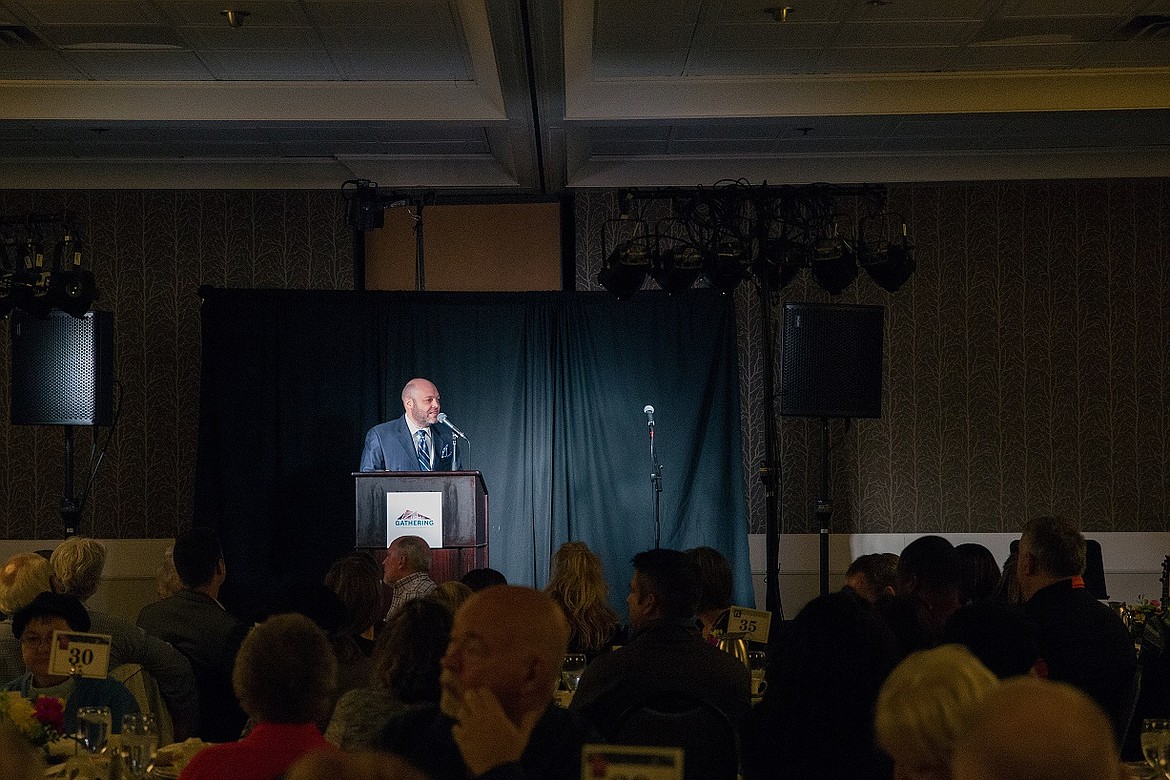UGM event examines impacts of trauma
The Union Gospel Mission (UGM) explored the relationship between traumatic childhood events, addiction and homelessness Tuesday evening at its annual gathering at the Best Western Plus Coeur d’Alene Inn.
Several individuals shared their experiences and Dr. Mark Baird, assistant professor of psychology at Whitworth University, explained how trauma impacts the brain.
“With trauma, we’re no longer fully able to put together what we’re seeing, hearing, smelling, or even what our body is feeling,” Baird said. “If we cannot escape that trauma, all of a sudden our body can completely shut down, our mind checks out, and we can dissociate.”
Baird cited figures from a Kaiser Permanente and the Centers for Disease Control and Prevention study showing adverse childhood events (ACEs) have a significant impact on individuals throughout their lives.
ACEs include emotional, physical and sexual abuse, parental separation, living with a mother who was abused, and having a household member incarcerated or abusing substances.
“If someone has experienced four ACEs, that doubles their risk of heart disease and cancer,” Baird said. “It increases the likelihood of alcoholism by 700 percent. It increases the risk of a suicide attempt by 1200 percent.”
Stephanie Bisaro — whose mother abandoned her and moved to Texas when Bisaro was 12 years old — said that childhood trauma led her to believe she was incapable of being loved.
“If my own mother couldn’t love me and was willing to abandon me,” she said, “then why would anyone else love me?”
Bisaro said she had lost all hope before turning to Union Gospel Mission.
“Before coming to UGM, I was sitting in jail with no hope for the future,” Bisaro said. “I had lost custody of my children, and I thought, ‘This is it. Life will never be anything more than suffering and misery.’”
With the help of UGM, Bisaro obtained her GED and a full-time job, regained custody of two of her three children, and now lives in her own place. She said she has also been sober for more than two years.
Bill Murphy shared with the roughly 300 audience members how his father abused his mother, drank too much, and never attempted to be involved in his life.
Murphy said he came to hate his father and lashed out by using alcohol and drugs. He said he began drinking at 8 years old and first smoked marijuana at the age of 12.
“My hatred for my father fueled my early rebellion, my drinking, and my drug addiction,” Murphy said. “By the age of 18, I was a full-blown alcoholic. From there I went on to spend 30 years in addiction.”
According to Murphy, once he visited UGM, he was able to come to peace with his father and address his deep-seated feelings of abandonment and bitterness.
“I was able to mourn my father’s death and recognize that my hatred for him was really rooted in the intense need for his love,” he said. “I was able to forgive my father and to let go of the bitterness I had felt for him.”
Today, Murphy said he lives in his own apartment, works at a job he enjoys, and has been sober for nearly three years.
Rachael Kane and Jocelyne Weis also shared their stories of overcoming childhood trauma.
Kane said her father was physically abusive, which led her mother to become addicted to prescription pain pills.
After struggling with addiction herself, Kane is now sober and works at Safe Passage helping victims of domestic violence.
Weis said her mother and stepfather abused drugs and were largely absent in her life. At age 15, she was raped.
Presently, Weis lives in a home with her daughters and will take her real estate licensing exam next month.
According to Baird, it’s understandable that many of these individuals turned to drugs and alcohol as a coping mechanism.
“Childhood trauma teaches kids that life is dangerous,” Baird said. “The very home that is supposed to be a haven instead is a war zone.”
He described these traumatic events as setting off an alarm in the brain and said that drugs and alcohol can numb that terror felt by the brain.
“That’s why treating drug and alcohol addiction and homelessness isn’t just about changing a behavior,” Baird said. “It’s about quieting that alarm in a healthy, life-giving way.”



